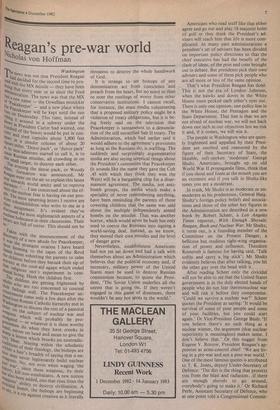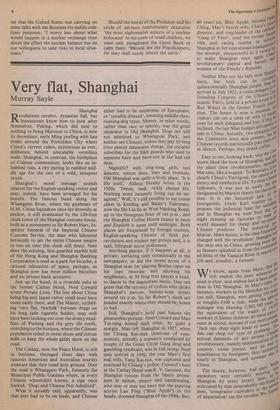' Reagan's pre-war world
h h
le.tolas von Hoffman Washington Washington e news was not that President Reagan
Th
, had decided for the second time to pro- ,i'eed with the MX missile — they have been ilcitthat every year or so since the Ford stration. The news was that the MX fact: new name — the Orwellian monicker t°h:r„eaeekeeper' — and a new place where ri ' reacekeeper will be kept until the sun riding on Doomsday. This time, instead of cig it around in a subway under the h"ert as President Carter had wanted, one c tindred ilcitthat every year or so since the Ford stration. The news was that the MX fact: new name — the Orwellian monicker t°h:r„eaeekeeper' — and a new place where ri ' reacekeeper will be kept until the sun riding on Doomsday. This time, instead of cig it around in a subway under the h"ert as President Carter had wanted, one c tindred of the beasts would be put in con- arete and steel capsules about 1,800 feet :11 in a slender column of about 20 .I.1:r,e Miles. 'Dense pack', or 'dunce pack, cals”.'"' non-admirers started to call it, is to 'se Russian missiles, all crowding in on 'ills small target, to destroy each other. AuPe evening the dense pack, or Woody k `4, formation was announced, Mr Reea!) gan went on the air to explain this latest al towards world amity and to reprove Zf annists. ' ... I am concerned about the ef- t. ' S.rthe nuclear fear is having on our peo- fr he most upsetting letters I receive are oaseint schoolchildren who write to me as a di8,,, assignment. It's evident they've 4,7ssed the most nightmarish aspects of a letinear holocaust in their classrooms. Their
kers
are full of terror. This should not be clitisTcoakveerny With the announcement of the , a new abode for Peacekeeper, sjia,,,nwceastitsnteesntrgangest oration I have heard ni to the tapes of the Revd thjchild„Joren ties exhorting the parents to calm th "nitY at the cool-aid agape which ended before they betook their sip of rtili%religious sect's experiment in corn- ing. Hush the children first. children are getting frightened by thmell,.its who are too concerned to conceal 40,r feelings well. The Peacekeeper an- A 'ken-lent came only a few days after the K winerican ,, le:h; oman Catholic hierarchy met in 'ngton to discuss the text of a pastoral we er 0. 4-tur„ II the subject of nuclear war and ns which will probably be pro- gengated — or whatever it is these worthy and genie.. do when they have crooks in sh, Mi II tres on head and mean to give the toeep a lesson which brooks no contradic- trZ.,;bleat. Staying within the scholastic withi."°ns of their theology, the bishops are tic, In a hair's breadth of saying that a na- wean 'nay never legitimately build nuclear wiusti)(2.ns. No, not even when waging 'the nat war' N0, since these weapons, by their hasnre, kill non-combatants. A new notion wezalso been added, one that rises from the civi 13.ntis' ability to destroy civilisation. A to se2clai bomb, the bishops are beginning "Y, is a sin against creation as it literally
threatens to destroy the whole handiwork of God.
It is strange to see bishops of any denomination act from conscience and preach from the heart, but no more so than to note the rustlings of worry from other conservative institutions. I cannot recall, for instance, the mass media volunteering that a proposed military policy might be a violation of treaty obligations, but it is be- ing freely said on the television that Peacekeeper is tantamount to a denuncia- tion of the still unratified Salt II treaty. The Administration, which had earlier said it would adhere to the agreement's provisions as long as the Russians do, is waffling. The suddenly and surprisingly argumentative media are also saying sceptical things about the President's contention that Peacekeeper (it sounds like the name they gave the Colt .45 with which they think they won the West) will be a bargaining chip for a disar- mament agreement. The media, not anti- bomb groups, the media which make a speciality of never remembering anything, have been reminding the parents of those cowering children that the same was said about the multiple independently aimed bombs on the missiles. That was another horror, which would never be built but only used to coerce the Russians into signing a world-saving deal. Instead, as we know, they moved their own missiles and the level of danger grew.
Nevertheless, establishment Americans had not yet sat down and had a talk with themselves about an Administration which believes that the political economy and, if necessary, military power of the United States must be used to destroy Russian communism because, to quote the Presi- dent, 'The Soviet Union underlies all the unrest that is going on. If they weren't engaged in this game of dominoes, there wouldn't be any hot spots in the world.' Americans who read stuff like that either agree and go out and play 18 majestic holes of golf or they think the President's ad- visers will teach him that life is more com- plicated. In many past administrations a president's set of advisers has been divided on important policy directions so that the chief executive has had the benefit of the clash of ideas, of the pros and cons brought out in debate. But presidents pick their own advisers and some of them pick people who are all more or less of the same opinion.
That's what President Reagan has done. This is not the era of Lyndon Johnson, when the hawks and doves in the White House roost pecked each other's eyes out. There is only one opinion, one policy line in the White House, the Pentagon and the State Department. That line is that we are not afraid of nuclear war, we will not back down one inch in our objectives lest we risk it and, if it comes, we will win it.
The people in Washington who are quiet- ly frightened and appalled by their Presi- dent are soothed and reassured by the figure of their Secretary of State, the likeable, soft-spoken 'moderate' George Shultz. Americans, brought up on old World War II propaganda films, think that if you shout and foam at the mouth you are an extremist and if you talk in Shultz-like tones you are a moderate.
In truth, Mr Shultz is as moderate or im- moderate as his predecessor, General Haig. Shultz's foreign policy beliefs and associa- tions and those of the other key figures in the Administration are described in a new book by Robert Scheer, a Los Angeles Times reporter, With Enough Shovels: Reagan, Bush and Nuclear War. Mr Shultz, it turns out, is a founding member of the Committee on the Present Danger, a bellicose but studious right-wing organisa- tion of power and influence. Theodore Roosevelt is famous for having said, 'Talk softly and carry a big stick'; Mr Shultz evidently believes that after talking, you hit the other guy over the head with it.
After reading Scheer only the civicidal will not be able to see that the United States government is in the duly elected hands of people who do not fear thermonuclear war and will risk it before they compromise. 'Could we survive a nuclear war?' Scheer quotes the President as saying: 'It would be survival of some of your people and some of your facilities, but you could start again.' Or Vice-President George Btish: 'If you believe there's no such thing as a nuclear winner, the argument (that nuclear superiority is meaningless) makes sense. I don't believe that.' Or this nugget from Eugene V. Rostow, President Reagan's ap- pointee as arms-control chief: 'We are liv- ing in a pre-war and not a post-war world.' One of the most famous quotes is attributed to T. K. Jones, deputy Under-Secretary of Defence: 'The dirt is. the thing that protects you from the blast and radiation. . if there are enough shovels to go around, everybody's going to make it.' Or Richard Perle, Assistant Secretary of Defence, who at one point told a Congressional Commit-
tee that the United States was carrying on arms talks with the Russians for public rela- tions purposes: 'I worry less about what would happen in a nuclear exchange than about the effect the nuclear balance has on our willingness to take risks in local situa- tions.' Should the words of the President and his circle of advisers inadvertently dramatise 'the most nightmarish aspects of a nuclear holocaust' in the souls of small children, we need only paraphrase the Good Book to calm them: 'Blessed are the Peacekeepers, for they shall surely inherit the earth.'











































 Previous page
Previous page